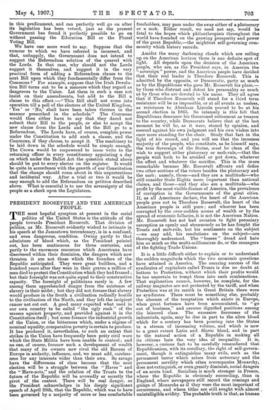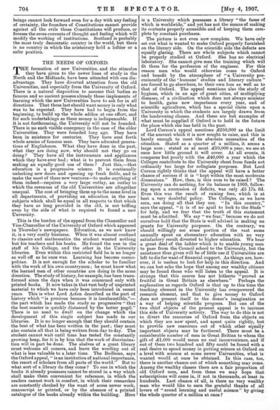PRESIDENT ROOSEVELT AND THE AMERICAN PEOPLE.
THE most hopeful symptom at present in the social politics of the United States is the attitude of the people towards President Roosevelt. That division of politics, as Mr. Roosevelt evidently wished to intimate in his speech at the Jamestown tercentenary, is in a confused, and even dangerous, condition. Owing partly to that admixture of blood which, as the President pointed out, has been continuous for three centuries, and partly to the enormous resources which Americans have discovered within their dominion, the dangers which now threaten it are not those which the founders of the Republic anticipated. They were great builders, and a hundred years after they were in their graves a million of men died to protect the Constitution which they had framed ; but their foresight was not quite equal to their constructive capacity. The foresight of politicians rarely is. A few among them apprehended danger from the existence of slavery in their midst ; but they did not foresee that slavery would produce in the South a civilisation radically hostile to the civilisation of the North, and they left the incipient cancer not cut out. A good many expected what used in our own country to be called " the ugly rush " of the masses against Property, and provided against it in the Constitution itself ; but none foresaw the industrial growth of the Union, or the bitterness which, under a regime of nominal equality, comparative poverty is certain to produce. It has produced it, nevertheless, to such an extent that strikes in the Union have frequently been petty civil wars which the State Militia have been unable to control ; and no one, of course, foresaw such a development of wealth that many of its owners now rival the old Barons of Europe in audacity, influence, and, we must add, careless- ness for any interests wider than their own. So savage have the differences of class become that the next election will be a struggle between the " Haves " and the " Have-nots," and the relation of the Trusts to the figure of the Republic will be avowedly or secretly the pivot of the contest. There will be real danger, as the President acknowledges in his deeply significant speech of April 26th, that the Republic, which was to have been governed by a majority of more or less comfortable
freeholders, may pass under the sway either of a plutocracy or a mob. Either result, we need not say, would be fatal to the hopes which philanthropists throughout the world have founded on the growing prosperity and power of the great Republic,—the mightiest self-governing com- munity which history records.
Amidst the many darkening clouds which are rolling up on the American horizon there is one definite spot of light. All depends upon the decision of the American people, who are, as the President says, in America the " sovereign " power, and the American people have decided that their real leader is Theodore Roosevelt. This is admitted by the opposite, or Democratic. party as much as by the Republicans who gave Mr. Roosevelt his place,—, by those who distrust and detest his personality as much as by those who are devoted to his name. They all agree that if Theodore Roosevelt will stand for a third term resistance will be as impossible, or at all events as useless, as resistance to Abraham Lincoln proved to be at his, second election in 1865. So intensely is this felt that Republicans denounce his threatened retirement as treason. to the country, while Democrats believe that at the last moment he will be, as it were, stoned by opinion, and coerced against his own judgment and his own wishes into once more standing for the chair. Study that 'fact in the. light of his record, and you will see that the immense majority of the people, who constitute, as he himself says,. the true Sovereign of the States, must be clean of the wish to support either plutocracy or mob-rule,—that the people wish both to be avoided or put down, whatever the effect and whatever the sacrifice. This is the more remarkable because Mr. Roosevelt affronts and defies two other sections of the voters besides the plutocracy and the mob; namely, those—and they are a multitude—who still consider State Rights more important than national , claims, and those—and they also are a multitude—who profit by the most visible disease of America, the prevalence of corruption in the Governments of the great cities. If, as all Americans declare, the heart of the American people goes out to Theodore Roosevelt, the heart of the American people is still pure ; and whoever has been corrupted by the over-sudden access of wealth or by the spread of economic fallacies, it is not the American Nation. Mr. Roosevelt has not had occasion to fight pecuniary, corruption as openly and strenuously as he has fought the Trusts and mob-rule, but his sentiments on the subject —we may add, his resolutions on the subject—are thoroughly understood. The "'bosses " dread and hate him as much as the multi-millionaires do, or the managers of the fighting Trade-Unions.
It is a little difficult either to explain or to understand the sudden magnitude which the two economic questions have attained in America. The amazing success of the syndicates of capitalists called Trusts is due no doubt at bottom to Protection, without which their profits would be too uncertain to tempt them into such combinations. That explanation cannot, however, be complete, for the. railway magnates are not protected by the tariff, and when Protection was at its zenith in Great Britain there were no syndicates. There must be something else, probably the absence of the temptation which exists in Europe, when great fortunes have been accumulated, to " go out of business," and assume dignified positions among • the leisured class. The excessive fierceness of the industrials, again, may be due in part to the alien blood which for a century has been pouring into the States in a stream of increasing volume, and which is now to a great extent Latin and Slavic blood, and in part to the natural action of a Republic in making all its citizens hate the very idea of inequality. It is, however, a curious fact to be carefully remembered that . Republicanism, with its corollary, the right of self-govern- ment, though it extinguishes many evils, such as the permanent terror which arises from autocracy and the permanent servility which often accompanies Monarchy, . does not extinguish, or even greatly diminish, social dangers of an acute kind. Socialism is much stronger in France, . where the Republic is obviously succeeding, than in England, where newspapers still record the comings and goings of l/fonarchs as if they were the most important of occurrences, and where titles are still sought with almost , unintelligible avidity. The irobable truth is that, as human
beings cannot look forward even for a day with any feeling of certainty, the founders of Constitutions cannot provide against all the evils those Constitutions will produce, or foresee the cross-currents of thought and feeling which will modify the working of institutions. Scotland is probably the most truly democratic country in the world, but there is no country in which the aristocracy hold a loftier or a safer position.















































 Previous page
Previous page